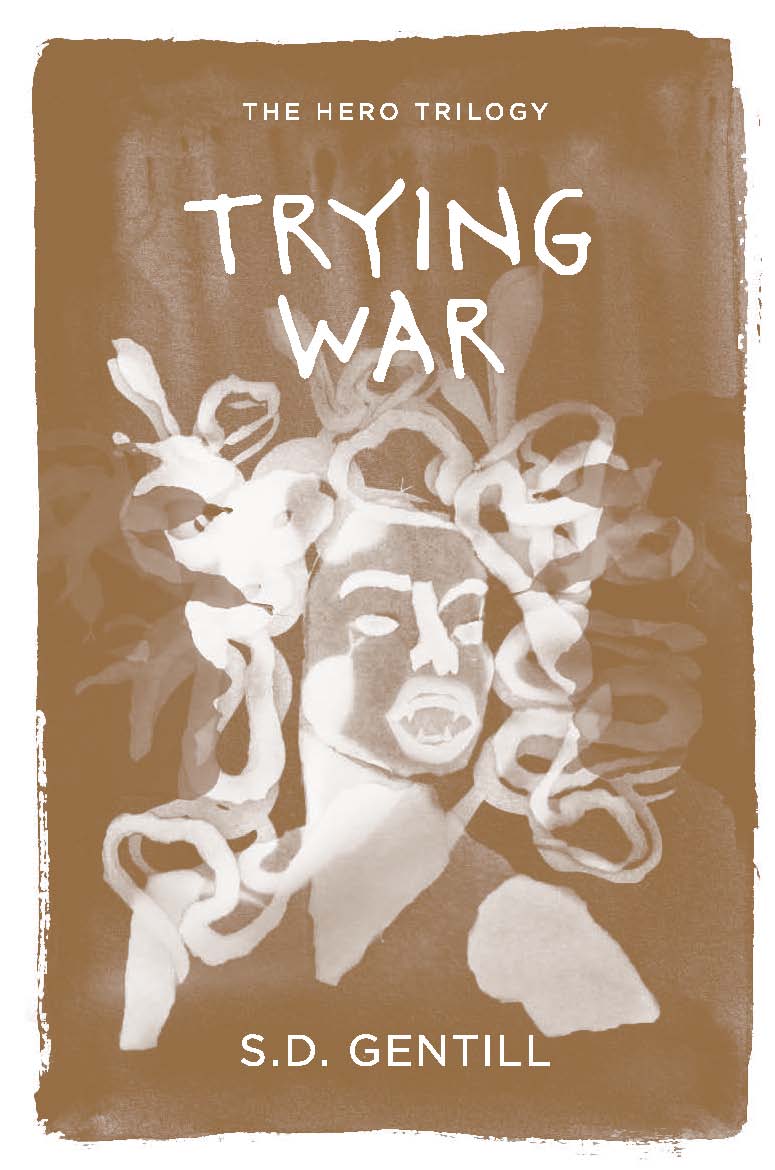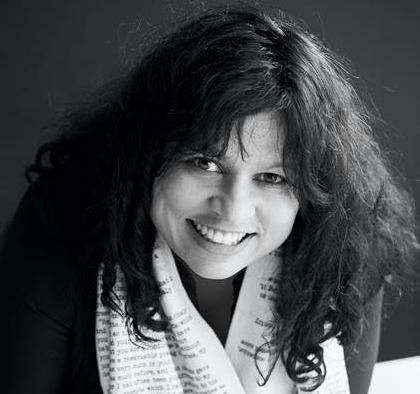Title of the work
Country of the First Edition
Country/countries of popularity
Original Language
First Edition Date
First Edition Details
Sulari D. Gentill, Trying War (The Hero Trilogy, 2). Sydney: Pantera Press, 2012, 391 pp.
ISBN
Genre
Action and adventure fiction
Alternative histories (Fiction)
Mythological fiction
Myths
Novels
Target Audience
Young adults
Cover

Courtesy of Pantera Press.
Author of the Entry:
Anne Rogerson, University of Sydney, anne.rogerson@sydney.edu.au
Peer-reviewer of the Entry:
Elizabeth Hale, University of New England, ehale@une.edu.au
Lisa Maurice, Bar-Ilan University, lisa.maurice@biu.ac.il

Courtesy of Pantera Press.
Sulari Gentill
, b. 1971
(Author)
Sulari Gentill is an Australian author, who was born in Sri Lanka, learnt to speak English in Zambia and grew up in Brisbane. After entering university to study astrophysics, she took a degree in corporate law; she is now a full-time writer, and lives on a truffle farm in the foothills of the Snowy Mountains in New South Wales with her historian husband and two sons. She is the author of an award-winning crime fiction series set in the 1930s in Australia and overseas, featuring a gentlemanly artist amateur detective, Rowland Sinclair. Writing as S. D. Gentill, she has also produced a trilogy of mythologically-inspired adventure novels for young adult readers: the Hero Trilogy. In 2017 she published her first work of literary fiction, Crossing the Lines.
Bio prepared by Anne Rogerson, University of Sydney, anne.rogerson@sydney.edu.au
Summary
Following immediately from the events of Chasing Odysseus, the second book of the trilogy, Trying War, continues the adventures of the young Hero and her adopted brothers, Machaon, Lycon and Cadmus. When they arrive home to rejoin the Herdsmen who live outside Troy, they find Mount Ida under attack by Amazons. The warrior women take Hero captive; a new journey begins as her brothers set out to rescue her, taking with them the nymph Oenone, Paris’ abandoned wife, and the wolf Lupa who had suckled the brothers as infants. Their quest confronts them with their Amazon heritage, as Gentill explores the implications of the fact that all four siblings are the rejected offspring of Amazon women (Hero and Machaon are the children of Penthesilea herself; the boys were rejected because of their sex, while the myopic and small-statured Hero was cast out for physical imperfection). For Machaon this question becomes particularly pointed, as Oenone brings Penthesilea’s remains to act as a passport among the Amazons. Machaon takes the desperate decision to rebury his mother’s body en route and to carry only the queen’s skull and breastplate, so that their knowledge of Penthesilea’s final resting place can serve as a bargaining chip with Hero’s Amazon captors. For this impious act, he soon finds himself haunted by the Furies, whose pursuit is to have life-changing consequences. But first the brothers travel to Kolchis, where they meet Medea and her father Aeietes. They reach the Amazon village to find the captive Hero being pressured to submit to Ares’ embraces, in order to produce a daughter in the royal line and continue Penthesilea’s dynasty.
As the four siblings gallop back to Aeietes’ palace after Hero’s rescue, the vengeful Furies catch up with Machaon; Medea reveals that only the gods can help him and persuades them to take her to Attica, where she says she will intercede with the Pantheon on the Herdsman’s behalf. Making landfall at Skyros, the travellers encounter king Lycomedes, his daughter Deideimara*, and their royal guest, Theseus, former king of Athens. There Medea performs a ritual that she claims will shield Machaon from the Furies; the siblings interrupt as she is in the process of turning him into a wolf and Machaon finds himself forever part-animal. Soon afterwards, Theseus’ overweening sense of entitlement, which extends to his host’s throne, brings strife to Skyros, and the siblings, with Medea, Oenone and Lupa, barely escape with their lives. They sail to Athens, where they are to petition the gods to pardon Machaon’s guilt. In Attica, they encounter Orestes and a number of other figures from Greek tragedy, at the Temple of the Furies, where the siblings take shelter. Venturing out in the morning, they meet Ares, who has been bound and awaits judgement after killing his daughter Alcippe’s rapist. Not knowing that the anguished father they have met is a god, the siblings promise to find Alcippe. A deal is struck that if Ares is pardoned by the gods for killing Poseidon’s son, he will intercede for Machaon; if not, Cadmus and Lycon will also be pursued by the pitiless Furies. Meanwhile, the Amazons attack Athens at Medea’s instigation and are turned away by the young Herdsmen’s desperate trickery. The gods deliberate Ares’ fate, and Athena transforms the Furies into the Eumenides, marking a new period of law and order. Athens is shaken by earthquake, Oenone is killed, and the siblings go home once more.
* In the quoted Apollodorus' Library the name is traditionally Deidamia.
Analysis
Consistent with the approach of the Hero Trilogy to which it belongs, Trying War uses the possibilities offered by inserting teenage characters into the iconic myths of ancient Greece and Rome to advance a new perspective on these well-known stories and their heroes. All three novels reflect early twenty-first century suspicions of powerful men and the stories they tell, and foreground the voices of those who are traditionally voiceless and powerless (children, women, the defeated and displaced). In Trying War, the sexual interest of ancient heroes in young girls is given particular attention, and the reactions of Hero and her protective brothers to the idea that women are prizes for the taking offer a modern, feminist view of the stories of ancient epic and tragedy. The interlude on Skyros also allows Gentill to provide a critical view of the interest of ancient heroes in fame (the boastful Theseus bores on unconvincingly about his conquest of the Minotaur, and the holes in his story are probed mercilessly by Lycon), as well as the rapacious and misogynistic attitudes that extend both to women and other men’s kingdoms. At the same time, the novel further probes the nature and difficulties of true heroism. Its heroes remain irreverent, humorous, intelligent and compassionate, the supporters and protectors of those victimised by the brawny, violent and arrogant supermen of ancient epic. Yet they also increasingly have to face their own imperfections and, in particular, the innate human tendency towards violence. Machaon – who becomes half-animal during the novel – is a focus for this interest. Through the rest of the series, he grapples to control his bestial nature as Gentill explores the psychological and moral implications of the characterisation of the heroes of ancient epic through animal similes (her young hero is far more troubled by his tendency towards uncontrolled rage than Achilles or Aeneas seem to be).
Further Reading
Lovatt, Caroline, Helen Lovatt, and Jonathan Lovatt, “Inheriting the Past: Children’s Voices and Parenting Experiences”, in Helen Lovatt and Owen Hodkinson, eds., Classical Reception and Children's Literature: Greece, Rome and Childhood Transformation, London and New York: I. B. Tauris, 2018, 272–287.
Rogerson, Anne, “Displaced Persons and Displaced Narratives in S. D. Gentill’s Hero Trilogy”, in Marguerite Johnson, ed., Antipodean Antiquities: Classical Reception Down Under, London: Bloomsbury Academic, 2019, 167–176.


